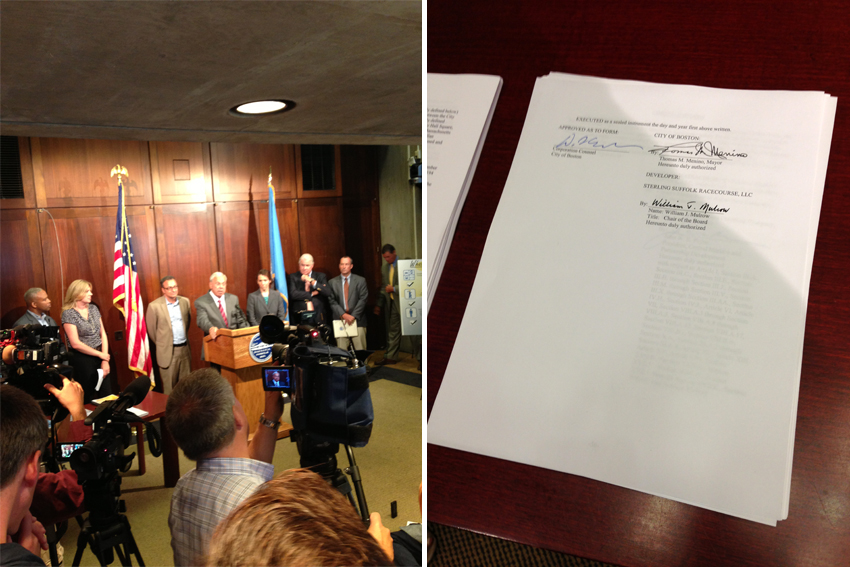Mayor Menino Doesn’t Care Whether You Vote On the Eastie Casino
Tuesday’s press conference announcing a deal between the City of Boston and Suffolk Downs to potentially bring a casino to Eastie was a mostly straightforward affair. Mayor Tom Menino gave the broad outlines of the agreement, which calls for the track to pay the city at least $32 million annually (and potentially much more if certain benchmarks are hit), provide 4,000 permanent, full-time jobs, and plop down a $33.4 million upfront payment to East Boston. (All of this, by the way, is contingent on the gaming commission electing to award Suffolk Downs a gaming license over competing bids in Everett and Milford.)
There was one mildly entertaining moment, though. According to the state’s gaming legislation, the deal must be approved by local referendum, and that vote must take place within 60 to 90 days. Since November 5 is Election Day and falls perfectly in that timeframe, it would make sense to do it then, right? When it was time for questions, WCVB’s Janet Wu asked just that. Standing behind Menino, East Boston City Councilor Sal LaMattina immediately started shaking his head no. At the podium, though, Menino played it cooler. He paused, prevaricated a bit, and then said it was really up the state gaming commission to decide when the vote is. Taking a cue, LaMattina stopped shaking his head.
Wily old Menino is no fool: he knows that the referendum is more likely to pass if it’s not held on Election Day. He also knows that it’s a little awkward to explain why. The fact is that a low turnout election favors the yes vote. The Suffolk Downs advantage here is money. They have plenty of it to spend on making sure their voters get out to the polls. The fewer casual voters there are—and thanks to the mayoral race, there will be plenty on Election Day—the more impact Suffolk Downs’ targeted efforts can have.
As it turns out, Menino is actually wrong about who chooses the election date: It’s up to the city to decide when it holds its referendum. Just to make sure, let’s pull out the ole casino law—*plops massive law on desk*—flip to page 27, find point 13 at the bottom of the page, and, ah, here we go: “the governing body of the municipality shall call for the election to be held not less than 60 days but not more than 90 days from the date that the request was received.”
So despite what Menino said, the city will get to choose when to hold the referendum. It’s a safe bet that it won’t be on Election Day.
Now, I can see your outrage building: How dare they spend extra taxpayer money on an election we don’t need! It is a flat-out waste to have this vote any day but the election day we already have scheduled! Well, not so fast. If you keep reading the casino law, on page 28, you’ll see this clause: “the municipality that holds an election shall be reimbursed for its expenses related to the election by the applicant within 30 days after the election.”
In other words, Suffolk Downs has to pay for this vote. Not having the referendum on Election Day won’t cost taxpayers a dime. Is scheduling the vote a different day strategic and maybe a bit cynical? Sure! But at least it’s not going to cost us anything.
This does bring up one other point, though. According to the law, in large cities like Boston, the casino referendum is limited to the ward where the facility would be located—in this case, East Boston. The City Council could elect to expand the vote to the whole city, but that seems unlikely. After the press conference, City Council President Steve Murphy told reporters that he didn’t think there was appetite for that on the council. While there are plenty of good arguments for and against an Eastie-only vote (and our mayoral candidates have made any of them), it does conveniently seem that an East Boston only referendum is more likely to pass than a citywide one. To help make his argument, Murphy pointed out that an Eastie only vote would be much cheaper. Per Garrett Quinn:
City Council President Murphy says a Ward only vote on East Boston casino would cost about $30,000. Citywide vote $400-500k. #bospoli
— Garrett Quinn (@GarrettQuinn) August 27, 2013
Of course, that should be nobody’s concern. Whether the vote costs $30,000 or $500,000, Suffolk Downs is on the hook for paying for all of it. Gaming Commission spokesperson Elaine Driscoll confirmed that via email.
The options, then, are really all in the city’s hands. It can decide when to hold the vote. And it can decide who gets to vote, without having to worry about the cost. And if past behavior is any indication, the city will also do anything it can to help pass the vote.



